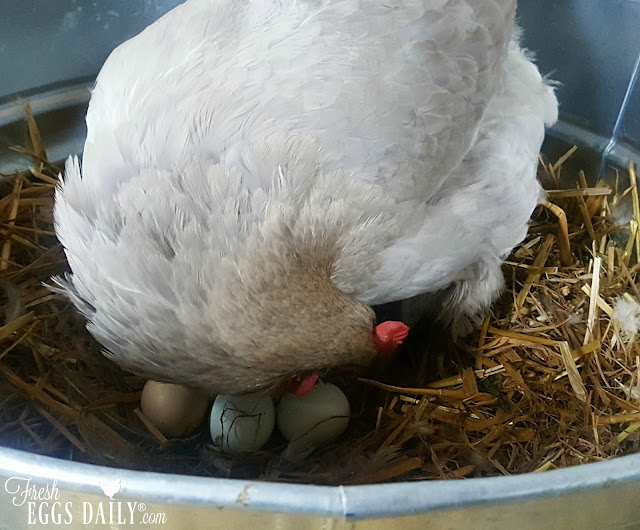
Many of you likely know that a hen lays an egg just about once every day. But how long does it actually take a chicken to lay an egg?
To start with, a chicken won't lay an egg every day. Most breeds of chickens will lay between 250-300 eggs a year. They'll slow down or stop during molting season, through the shorter days of winter, or if they're broody, and even extreme heat can take a toll on egg production, as can stress, say from a predator lurking. But usually through the spring and summer months, you can expect 5-7 eggs a week from your good layers.
After a spring pullet starts laying - somewhere between 18 and 28 weeks old or so - she'll lay well for the first year, laying right through that first winter without any supplemental light (a good reason to add new baby chicks each spring!). After that, her production will likely drop at 20% a year for the next few years until she's hardly laying at all.
But for all intents and purposes, let's assume your chicken is at peak laying age during peak laying season. So how long does it take her to lay a single egg?
The process of laying an egg takes between 24-26 hours, with most of the actual formation happening overnight. The creation of the eggshell makes up the longest portion of egg formation. In fact, a whopping 20 hours of that 24-26 hours is spent forming the shell. Obviously an egg needs a nice, thick, strong shell to protect the inside of the egg from bacteria and also to keep a developing chick safe.
A chicken will use the calcium in the layer feed she eats to help form the eggshell, along with the supplemental calcium you offer to her. If she doesn't have enough calcium available by those means, she will actually leach calcium from her bones. So supplying your chickens adequate calcium is a must. That's why I always recommend putting out a free-choice dispenser in your coop and keeping it filled. Each hen will only eat as much as she needs.
If you watch your chickens closely, you might notice that they stop off at your eggshell (or crushed oyster shell) dispenser just before hopping onto the roost for the night and gobble up a few mouthfuls of calcium. That's to ensure they have enough calcium for the shell of the egg they'll be working on that night!
But back to the beginning.... Immediately after laying her egg each morning, a chicken's body will release a new yolk. A hen is born with all the yolks in her ovaries that she will lay throughout her lifetime. Although a chicken will likely lay only about a thousand eggs in her lifetime, she comes equipped with several thousand yolks, so there's no danger that she'll run out! The yolks aren't full-sized, they're tiny.
So let's hypothetically say that your chicken lays her egg at ten o'clock one morning. I've noticed from watching my chickens over the years, that she'll sit in the nesting box, arranging the straw, nestling in, making sure everything is perfect, for about twenty minutes before she actually lays her egg.
10:00am The hen lays her egg. (about 20-30 minutes)
10:30am A new yolk (or ova) is released from her ovary. (30 minutes)
11:00am The yolk enters the reproductive tract and a thin membrane encases it. Then the white (albumen) starts to form around it. (3 hours)
2:00pm The encased yolk continues to travel and begins to take on the oval egg-shape, then another double membrane is formed around the whole thing. (60 minutes)
3:00pm The mass enters the uterus where the shell is created. (20 hours)
6:00am Brown pigment is applied to the eggshell in those breeds that lay brown eggs - blue pigment is applied earlier in the process in those breeds that lay blue eggs - and brown is applied over the blue in the green egg laying breeds. (during the last 5 hours of the shell formation process)
11:00am A clear coating called the "bloom" or "cuticle" is applied to the surface of the shell. This coating helps to keep air and bacteria out of the egg. A bit of natural lubricant is also applied to help the egg exit the hen's vent. (60 minutes)
Noon Time to lay that egg! After settling in the nesting box for about half an hour as I mentioned, the hen will stand up slightly in the box, squatting over the nest, just before she's about to lay her egg. The egg, which has been traveling down the oviduct pointy end first and spiraling (like a bullet exiting a rifle), will actually flip so that it exits the vent blunt end down, ensuring a softer landing into the nest.
And as you can see, it's now just about 26 hours from the time the chicken laid her last egg. So two hours later than she laid her egg the previous morning. She'll continue in the same vein for another few days, laying her egg an hour or two later than she laid it the previous day, and then most likely take a day off - since she won't lay an egg at night - then lay her next egg bright and early the following morning.
How Long Does It Take a Chicken to Lay an Egg?was originally posted by Favorite Chicken Blogs







No comments:
Post a Comment